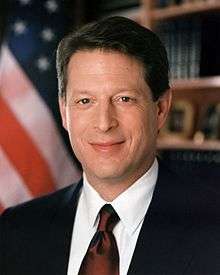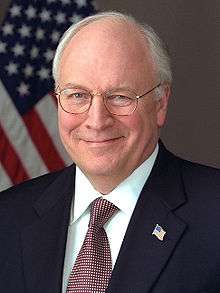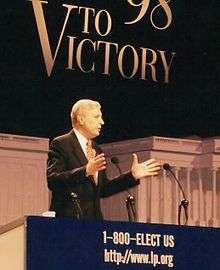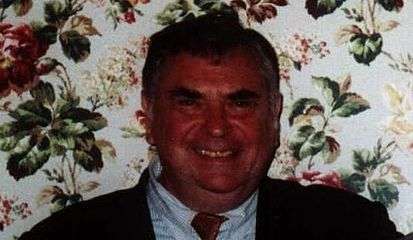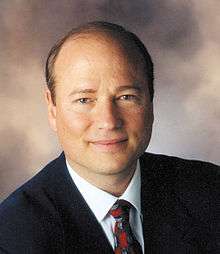United States presidential debates, 2000
The United States presidential election debates were held during the 2000 presidential elections. Three debates were held between Republican candidate, Texas Governor George W. Bush and Democratic incumbent Vice President Al Gore, the major candidates. One debate was held with their vice presidential running mates, Dick Cheney and Joe Lieberman. All four debates were sponsored by the non-profit Commission on Presidential Debates (CPD), which has organized presidential debates since its establishment in 1987.
The vice presidential debate was held on October 5 at Centre College. The presidential debates were held on October 3 at the University of Massachusetts Boston, October 11 at Wake Forest University, and October 17 at Washington University, ahead of the November 7 Election Day. Jim Lehrer moderated each of the presidential debates. In each of the first two debates, the candidates received questioned in turn with two minutes to answer and a 60-second rebuttal. The third and final debate featured a town hall meeting format.
Participant selection
In 2000, the following 8 candidates achieved ballot access in enough states to mathematically win the election via the Electoral College:
| Presidential Candidate | Party | Ballot access |
|---|---|---|
| George W. Bush | Republican | 50+DC |
| Al Gore | Democratic | 50+DC |
| Harry Browne | Libertarian | 49+DC |
| Pat Buchanan | Reform | 49 |
| Ralph Nader | Green | 43+DC |
| Howard Phillips | Constitution | 41 |
| John Hagelin | Natural Law | 38 |
Responding to criticism received from the exclusion of Ross Perot in the 1996 campaign, the Commission on Presidential Debates adjusted the criteria used to invite candidates, announcing on January 6, 2000 that third-party candidates would have to reach 15 percent in pre-debate polls to receive an invitation.
Only Governor George W. Bush and Vice President Al Gore met the CPD selection criteria for any of the presidential debates. As a result, only Dick Cheney and Joe Lieberman met the criteria for the vice presidential debate.[1][2][3]
Schedule
Three presidential debates were scheduled by the Commission on Presidential Debates:
- October 3 at the University of Massachusetts Boston, with questions from moderator Jim Lehrer of PBS;
- October 11 at Wake Forest University, with questions from moderator Jim Lehrer of PBS;
- October 17 at Washington University in St. Louis, in a town-hall format moderated by Jim Lehrer of PBS.
One vice-presidential debate was held:
- October 5 at Centre College, moderated by Bernard Shaw of CNN.
First presidential debate (University of Massachusetts Boston)
The Debate was held in the Clark Athletic Center on the campus of the University of Massachusetts Boston.
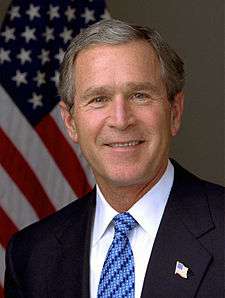
Texas
Jim Lehrer of PBS' The NewsHour posed the following questions for each candidate:
Questions for Vice President Gore
- You have questioned whether Governor Bush has the experience to be President of the United States. What exactly do you mean?
- So I take it by your answer, then, Mr. Vice President, that in an interview recently with the "New York Times" when you said that you questioned whether or not Governor Bush has experience enough to be president, you were talking about strictly policy differences.
- As a practical matter, both of you want to bring prescription drugs to seniors, correct?
- How would you contrast your approach to preventing future oil price and supply problems like we have now to the approach of Governor Bush?
- If elected president, would you try to overturn the FDA's approval last week of the abortion pill RU-486?
- What kind of [Supreme Court] appointments should they expect from you?
- What code phrases should we read by what you said about what kind of people you would appoint?
- If President Milosevic of Yugoslavia refuses to accept the election results and leave office, what action, if any, should the United States take to get him out of there?
- How would you go about as president deciding when it was in the national interest to use U.S. force, generally?
- How should the voters go about deciding which one of you is better suited to make the kinds of decisions, whether it's Milosevic or whatever, in the military and foreign policy area?
- Should the voters of this election see this in the domestic area as a major choice between competing political philosophies?
- Can you point to a decision, an action you have taken, that illustrates your ability to handle the unexpected, the crisis under fire?
- Both of you have Social Security reform plans, so we could spend the rest of the evening and two or three other evenings talking about them in detail. We won't do that. But, many experts, including Federal Reserve Chairman Greenspan say that it will be impossible for either of you, essentially, to keep the system viable on its own during the coming baby boomer retirement onslaught without either reducing benefits or increasing taxes. You disagree?
- Are there issues of character that distinguish you from Governor Bush?
Questions for Governor Bush
- When you hear Vice President Gore question your experience, do you read it the same way, that he's talking about policy differences only?
- You have questioned whether Vice President Gore has demonstrated the leadership qualities necessary to be President of the United States. What do you mean by that?
- As a practical matter, both of you want to bring prescription drugs to seniors, correct?
- So if somebody is watching tonight and listening to what the two of you just said, is it fair to say, okay, the differences between Governor Bush and Vice President Gore are as follows. You're for doing something on the consumption end and you're for doing something on the production end? How would you draw the difference?
- If elected president, would you try to overturn the FDA's approval last week of the abortion pill RU-486?
- Should a voter assume that all judicial appointments you make to the supreme court or any other court, federal court, will also be pro-life?
- Is the vice president right? Is that a code word for overturning Roe v. Wade?
- If President Milosevic of Yugoslavia refuses to accept the election results and leave office, what action, if any, should the United States take to get him out of there?
- How would you go about as president deciding when it was in the national interest to use U.S. force, generally?
- How should the voters go about deciding which one of you is better suited to make the kinds of decisions, whether it's Milosevic or whatever, in the military and foreign policy area?
- Should the voters of this election, Vice President Gore, see this in the domestic area as a major choice between competing political philosophies?
- Both of you have promised dramatically to change—to change dramatically public education in this country. Of the public money spent on education, only 6% of that is federal money. You want to change 100% of the public education with 6% of the money, is that possible?
- All right. So having heard the two of you, the voters have just heard the two of you, what is the difference? What is the choice between the two of you on education?
- Can you point to a decision, an action you have taken, that illustrates your ability to handle the unexpected, the crisis under fire?
- There could be a crisis, for instance, in the financial area, the stock market could take a tumble, there could be a failure of a major financial institution. What is your general attitude toward government intervention in such events?
- Would you agree there is no basic difference here on intervening—on federal government intervening in what might be seen by others to be a private financial crisis?
- Are there issues of character that distinguish you from Vice President Gore?
- What are you saying when you mention the fundraising scandals or the fundraising charges that involve Vice President Gore? What are you saying that the voters should take from that that's relevant to this election?
Transcript
- Debate transcript from the Commission on Presidential Debates website.
Viewership
An estimated 46.6 million viewers tuned into the debate.
Vice presidential debate (Centre College)
The Debate was held in the Norton Center for the Arts on the campus of Centre College in Danville, Kentucky.
Bernard Shaw of CNN posed the following questions for each candidate:
Questions for Secretary of Defense Cheney
- Few hard working Americans would base their well-being on bonuses they hope to get five or ten years from now. Why do you predict surpluses you cannot possibly guarantee to pay for your proposed programs?
- You alluded to problems. There's no magic bullets to solve the problems of public education. What is the next best solution?
- This is the 21st Century. Yet on average an American working woman in our great nation earns 75 cents for each $1 earned by a working male. What do you males propose to do about it?
- Would you support the effort of House Republicans who want legislation to restrict distribution of the abortion drug RU-486?
- If Yugoslavia’s Slobodan Milosevic prevails, notwithstanding the election results, would you support his overthrow?
- You and Governor Bush charge the Clinton-Gore administration have presided over the deterioration and overextension of America's armed forces. Should U.S. military personnel be deployed as warriors or peacekeepers?
- If Iraq's president Saddam Hussein were found to be developing weapons of mass destruction, Governor Bush has said he would, quote, "Take him out." Would you agree with such a deadly policy?
- Many experts are forecasting continuing chaotic oil prices in the world market. Wholesale natural gas prices here in our country are leaping. Then there are coal and electricity. Have previous Republican and Democratic Congresses and administrations, including this one, done their job to protect the American people?
- you sponsored a bill that said no to oil and gas exploration in the Wyoming wilderness areas of your home state. However, you co-sponsored a bill that said yes to drilling in the Arctic National Wildlife Refuge. Your explanation?
- Washington is a caldron of political bickering and partisanship. The American people, gentleman, have had enough. How would you elevate political discourse and purpose?
- Imagine yourself an African-American. You become the target of racial profiling either while walking or driving. What would you do about it?
- Should a male who loves a male and a female who loves a female have all—all the constitutional rights enjoyed by every American citizen?
- Vice President of the United States of America, what would you bring to the job that you're opponent wouldn't?
- Have you noticed a contradiction or hypocritical shift by your opponent on positions and issues since he was nominated?
Questions for Senator Lieberman
- Senator, few hard working Americans would base their well-being on bonuses they hope to get five or ten years from now. Why do you, and you, Secretary Cheney, predict surpluses you cannot possibly guarantee to pay for your proposed programs?
- There's no magic bullets to solve the problems of public education. What is the next best solution?
- This is the 21st Century. Yet on average an American working woman in our great nation earns 75 cents for each $1 earned by a working male. What do you males propose to do about it?
- If Yugoslavia’s Slobodan Milosevic prevails, notwithstanding the election results, would you support his overthrow?
- Once again in the Middle East, peace talks on the one hand, deadly confrontations on the other, and the flashpoint, Jerusalem, and then there's Syria. Is United States policy what it should be?
- If Iraq's president Saddam Hussein were found to be developing weapons of mass destruction, Governor Bush has said he would, quote, "Take him out." Would you agree with such a deadly policy?
- Many experts are forecasting continuing chaotic oil prices in the world market. Wholesale natural gas prices here in our country are leaping. Then there are coal and electricity. Have previous Republican and Democratic Congresses and administrations, including this one, done their job to protect the American people?
- We all know Social Security is the backbone of the retirement system in our nation. Can either of you pledge tonight categorically that no one will lose benefits under your plans?
- Imagine yourself an African-American. You become the target of racial profiling either while walking or driving. African-American Joseph Lieberman, what would you do about it?
- Should a male who loves a male and a female who loves a female have all—all the constitutional rights enjoyed by every American citizen?
- Vice President of the United States of America, what would you bring to the job that your opponent wouldn't?
Transcript
- Debate transcript from the Commission on Presidential Debates website.
Viewership
An estimated 28.5 million viewers tuned into the debate.
Second presidential debate (Wake Forest University)
The debate was held in the Wait Chapel on the campus of the Wake Forest University in Winston-Salen, North Carolina.
Jim Lehrer of PBS' The NewsHour posed the following questions for each candidate:
Questions for Vice President Gore
- One of you is about to be elected the leader of the single-most powerful nation in the world, economically, financially, militarily, diplomatically, you name it. Have you formed any guiding principles for exercising this enormous power?
- The governor mentioned the Middle East. Here we're talking at this stage in the game about diplomatic power that we have. What do you think the United States should do right now to resolve that conflict over there?
- So you don't believe, Vice President Gore, that we should take sides and resolve this right now? A lot of people pushing hey, the United States should declare itself and not be so neutral in this particular situation.
- People watching here tonight are very interested in Middle East policy, and they are so interested they want to base their vote on differences between the two of you as president how you would handle Middle East policy. Is there any difference?
- In the last 20 years there have been eight major actions that involved the introduction of U.S. ground, air or naval forces. Let me name them. Lebanon, Grenada, Panama, the Persian Gulf, Somalia, Bosnia, Haiti, Kosovo. If you had been president for any of those interventions, would any of those interventions not have happened?
- Do you have any second thoughts on [Rwanda], based on what you said a moment ago about genocide?
- Vice President Gore, do you agree with the governor's views on nation building, the use of military, our military, for nation building as he described and defined it?
- Do you think we're meeting our [financial] obligations properly?
- Vice President Gore, would you support or sign, as president, a federal law banning racial profiling by police and other authorities at all levels of government?
- Vice President Gore, what would be on your racial discrimination elimination list as president?
- Both Senator Lieberman and Secretary Cheney said they were sympathetically rethinking their views on same sex relationships. What's your position on that?
- How do you see the connection between controlling gun sales in this country and the incidence of death by accidental or intentional use of guns?
- Both of you have talked much about Medicare and health care for seniors. What about the more than 40 million younger Americans who do not have health insurance right now? What would you do about that?
- In your 1992 book you said, quote, "We must make the rescue of our environment the central organizing principle for civilization and there must be a wrenching transformation to save the planet." Do you still feel that way?
- Where do you see the basic difference in very simple terms in two or three sentences between you and the governor on the environment? If a voter wants to make a choice, what is it?
Questions for Governor Bush
- One of you is about to be elected the leader of the single-most powerful nation in the world, economically, financially, militarily, diplomatically, you name it. Have you formed any guiding principles for exercising this enormous power?
- Should the people of the world look at the United States, Governor, and say, should they fear us, should they welcome our involvement, should they see us as a friend, everybody in the world? How would you project us around the world, as president?
- Does our wealth, our good economy, our power, bring with it special obligations to the rest of the world?
- What do you think the United States should do right now to resolve that conflict [in the Middle East]?
- Saddam Hussein, you mean, get him out of there?
- Should the fall of Milosevic be seen as a triumph for U.S. military intervention?
- Do you think that Milosevic would not have fallen if the United States and NATO had not intervened militarily? Is this a legitimate use of our military power?
- in the last 20 years there have been eight major actions that involved the introduction of U.S. ground, air or naval forces. Let me name them. Lebanon, Grenada, Panama, the Persian Gulf, Somalia, Bosnia, Haiti, Kosovo. If you had been president for any of those interventions, would any of those interventions not have happened?
- Governor, that Vice President Gore mentioned, 600,000 people died in Rwanda in 1994. There was no U.S. intervention, no intervention from the outside world. Was that a mistake not to intervene?
- So what would you say, Governor, that somebody would say hey wait a minute, why not Africa, I mean why the Middle East, why the Balkans, but not Africa, when 600,000 people's lives are at risk?
- You said in the Boston debate, Governor, on this issue of nation building, that the United States military is overextended now. Where is it overextended? Where are there U.S. military that you would bring home if you become president?
- Some people are now suggesting that if you don't want to use the military to maintain the peace, to do the civil thing, is it time to consider a civil force of some kind that comes in after the military that builds nations or all of that? Is that on your radar screen?
- In the non-military area of influencing events around the world, the financial and economic area, the World Bank President Wolfensohn said recently, Governor, that U.S. contributions to overseas development assistance is lower now almost than it has ever been. Is that a problem for you? Do you think—what is your—what is your idea about what the United States' obligations are? I'm talking about financial assistance and that sort of thing to other countries, the poor countries.
- If you become president, Governor, are there other areas, racial problem areas, that you would deal with as president involving discrimination? Like you said, Arab-Americans, but also Hispanics, Asians, as well as Blacks in this country.
- Would you support a national hate crimes law?
- Both Senator Lieberman and Secretary Cheney said they were sympathetically rethinking their views on same sex relationships. What's your position on that?
- Do you believe in general terms that gays and lesbians should have the same rights as other Americans?
- How do you see the connection between controlling gun sales in this country and the incidence of death by accidental or intentional use of guns?
- Both of you have talked much about Medicare and health care for seniors. What about the more than 40 million younger Americans who do not have health insurance right now? What would you do about that?
- If somebody wanted to vote on the environment, how would you draw the differences, Governor?
- What about global warming?
- You, your running mate, your campaign officials have charged that Vice President Gore exaggerates, embellishes and stretches the facts, etcetera. Are you—do you believe these are serious issues? This is a serious issue that the voters should use in deciding which one of you two men to vote for on November 7?
Transcript
- Debate transcript from the Commission on Presidential Debates website.
Viewership
An estimated 37.5 million viewers tuned into the debate.
Third presidential debate (Washington University in St. Louis)
The debate was held at the Field House on the campus of Washington University in St. Louis, Missouri
Jim Lehrer of PBS' The NewsHour moderated the town hall style debate featuring the following questions asked by members of the audience:
Questions for Vice President Gore
- How do you feel about HMOs and insurance companies making the critical decisions that affect people's lives instead of the medical professionals, and why are the HMOs and insurance companies not held accountable for their decisions?
- We spend billions of dollars every year on taxes, or pay billions of dollars in taxes. Would you be open to the idea of a national health care plan for everybody? And if not, why? If so, is this something you would try to implement if you are elected into office and what would you do to implement this plan?
- Mr. Vice President, in a school district in which I work and in countless others across the nation, we face crumbling school buildings, increased school violence, student apathy, overcrowding, lack of funding, lawsuits, the list goes on. I could mention low teacher pay but I won't. What can you tell me and my fellow American teachers today about your plans for our immediate future?
- Mr. Vice President, today our military forces are stretched thinner and doing more than they have ever done before during peacetime. I would like to know what you are—I think we would all like to know what you as president would do to ensure proper resourcing for the current mission and/or more selectively choosing the time and place that our forces will be used around the world.
- Vice President Gore. The family farms are disappearing and having a hard time even in the current positive economic environment. What steps would you or your administration take on agricultural policy developments to protect the family farms for this multi-functional service they perform?
- It seems that when we hear about issues of this campaign, it's usually Medicare, Social Security or prescription drugs. As a college professor, I hear a lot of apathy amongst young people who feel that there are no issues directed to them. And they don't plan to vote. How do you address that?
- How will your tax proposals affect me as a middle-class, 34-year-old single person with no dependents?
- Yes. My 6th grade class at St. Claire's School wanted to ask of all these promises you guys are making and all the pledges, will you keep them when you're in office?
Questions for Governor Bush
- Are either of you concerned with—are either of you concerned with finding some feasible way to lower the price of pharmaceutical drugs such as education on minimizing intake, revamp of the FDA process or streamlining the drug companies' procedures instead of just finding more money to pay for them?
- I've heard a lot about education and the need to hold teachers and schools accountable, and I certainly agree with that. But as an individual with an educational background, and also a parent, I have seen a lot of instances where the parents are unresponsive to the teachers or flat out uninvolved in their child's education. How do you intend to not only hold the teachers and schools accountable but also hold parents accountable?
- What would you make—what would make you the best candidate in office during the Middle East crisis?
- Would like to know why you object to the Brady Handgun bill, if you do object to it. Because in a recent TV ad it showed that the National Rifle Association says that if you are elected, that they will be working out of your office. That kind of bothers me when I see an ad like that. I want you to explain that ad to me.
- Hi, Governor. I'm very concerned about the morality of our country now. TV, movies, the music that our children are, you know, barraged with every day. And I want to know if there's anything that can be worked out with the—Hollywood, or whoever, to help get rid of some of this bad language and whatever, you know. It's just bringing the country down. And our children are very important to us and we're concerned about their education at school. We should be concerned about their education at home, also. Thank you.
- Hi. How will your administration address diversity, inclusiveness, and what role will affirmative action play in your overall plan?
- In one of the last debates held, the subject of capital punishment came up, and in your response to the question, you seemed overly joyed and as a matter of fact proud that Texas led the nation in the execution of prisoners. Sir, did I misread your response and are you really, really proud of the fact that Texas is number one in executions?
Transcript
- Debate transcript from the Commission on Presidential Debates website.
Viewership
An estimated 37.7 million viewers tuned into the debate.
Third-party debates
- September 28, 2000 - The Independence Party of Minnesota sponsored a third party presidential debate moderated by Minnesota Governor Jesse Ventura. In attendance for this debate were Libertarian candidate Harry Browne, Constitution Party candidate Howard Phillips, and Natural Law Party candidate John Hagelin. Both Ralph Nader and Pat Buchanan declined invitations to attend.
- October 20, 2000 - Judicial Watch sponsored a third party presidential debate at the Ronald Reagan Building in Washington, DC, moderated by radio broadcaster Jim Bohannon. Once again, Browne, Phillips, and Hagelin participated while Nader and Buchanan declined invitations.
- November 3, 2000 - American University's Department of History and Commission on Fair Elections sponsored a third party vice presidential debate at the National Press Club. Participating were vice presidential candidates Art Olivier of the Libertarian Party, Dr. J. Curtis Frazier of the Constitution Party, and Nat Goldhaber representing the Natural Law Party. Winona LaDuke and Ezola Foster of the Green and Reform Parties declined invitations.[4]
References
- ↑ "What Happened in 2000?". opendebates.org. Retrieved 2014-10-26.
- ↑ "The Appleseed Citizens' Task Force On Presidential Debates: A Blueprint for Fair and Open Presidential Debates". reclaimdemocracy.org. Retrieved 2014-10-26.
- ↑ "2000 Debates". debates.org. Retrieved 2014-10-26.
- ↑ "Debates". www.gwu.edu. Retrieved 2014-10-26.
